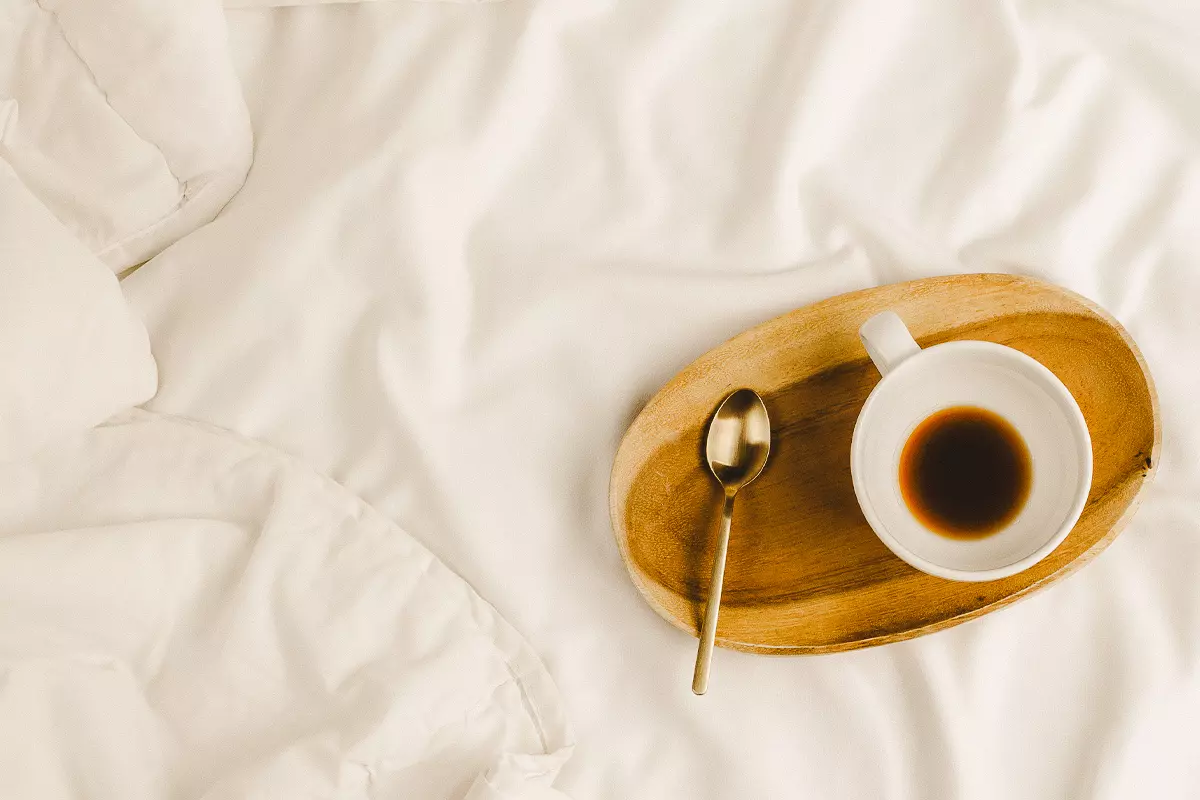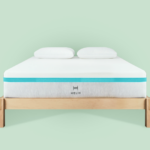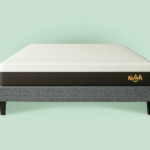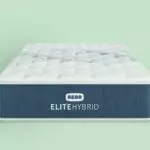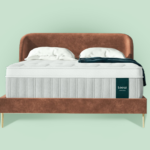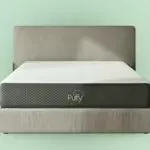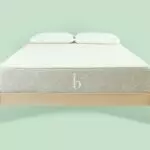Table of Contents
A good night’s sleep is essential to a healthy body and mind, both of which play a crucial role in mental health. That’s why it’s so important to find a bed that’s comfortable for you. For some people, that means seeking out a soft mattress. A softer mattress that contours around the shoulders and hips but still provides ample support for spinal alignment can be a good fit for side sleepers in particular.
While mattress companies use firmness ratings to help people understand how a mattress might feel, it’s important to understand that there isn’t a universal firmness standard. What’s more, body type, body weight, and sleep position all play a big role in how soft or firm a mattress feels. That means the same mattress can feel firmer or softer, depending on who’s sleeping on it.
Tip
Typically, lighter-weight sleepers perceive mattresses to feel firmer than they are, and higher-weight sleepers perceive mattresses to feel softer than they are. Keep in mind that most mattresses are designed for the average-weight person.
In the list of the best soft mattresses below, we’ve included a variety of options to suit different sleep styles, preferences, and budgets.
Best soft mattress overall
Helix has an original line of six hybrid mattresses, each with a different level of firmness. We chose the Helix Sunset for this list because it offers sleepers a cushy top layer of memory foam. At the same time, a bottom layer of wrapped coils provides support and works to keep sleepers from sinking too far into the bed.
HelpGuide Handbook for soft mattresses
Here’s five things you should know about soft mattresses:
Our picks for the best soft mattresses
- Helix Sunset: Best overall
- Nolah Original Hybrid: Best value soft mattress
- Bear Elite Hybrid: Best soft mattress for stomach sleepers
- Leesa Sapira Chill: Best soft mattress for side sleepers
- Puffy Cloud: Best soft memory foam mattress
- Birch Natural: Best soft mattress for back pain
Compare the best soft mattresses
| Price | $937–$1,749 | $1,299–$2,798 | $1,893–$3,920 | $1,499–$2,399 | $1,949–$4,198 | $1,499–$2,499 |
| Firmness | 5.5/10 | 5/10 | 6.5/10 | 6/10 | 6/10 | 6.5/10 |
| Material | Hybrid | Hybrid | Hybrid | Hybrid | Foam | Latex hybrid |
| Warranty | 10 years | Yes | Lifetime | 10 years | Lifetime | 25 years |
| Trial period | 100 nights | 120 nights | 120 nights | 100 nights | 101 nights | 100 nights |
| Best for | Side and back sleepers | Side and back sleepers | Stomach sleepers and hot sleepers | Hot sleepers and side sleepers | Back and side sleepers and anyone wanting a memory foam feel | Eco-conscious shoppers and sleepers with back pain |
The best soft mattresses reviews
Best soft mattress overall: Helix Sunset
The Helix Sunset is the softest of the six hybrid mattresses in Helix’s original line of beds. When we lay on it and tested its firmness, we gave it a 5.5 out of 10 on our mattress firmness scale (for context, 6.5 is the industry standard for medium-firm). During testing, we found the Helix Sunset offered plenty of contouring and pressure relief, largely thanks to its top layer of ultra-soft Memory Plus foam—a more responsive alternative to standard memory foam. We felt the most comfortable in back- and side-sleeping positions.
Our final verdict on the Helix Sunset
Although the Helix Sunset felt soft when we lay on it, we also wanted to get a good read on its pressure-relieving abilities, which we tested with our pressure map. This involves spreading a specialized mat across the bed’s surface. The mat then uses thermal imaging to display how much pressure the mattress puts on different parts of the body in different sleeping positions. Blue indicates no pressure, and red indicates high pressure, with a color spectrum in between. The graphic was mostly blue in all sleeping positions, with just a touch of green. This tells us that the Helix Sunset is a soft mattress providing plenty of deep pressure relief. Side sleepers in particular should experience a lot of contouring at their shoulders and hips, where they put the most pressure.
From our tester
The memory foam layer gives me the cushiony, sinking feeling that memory foam is known for.
Because the Helix Sunset has a strong layer of coils, it also created ample support despite the softness of this mattress. We didn’t feel like we were sinking too far into its layers. Plus, the coils promote airflow, which helps the Sunset sleep cool. Read more about this mattress in our Helix review.
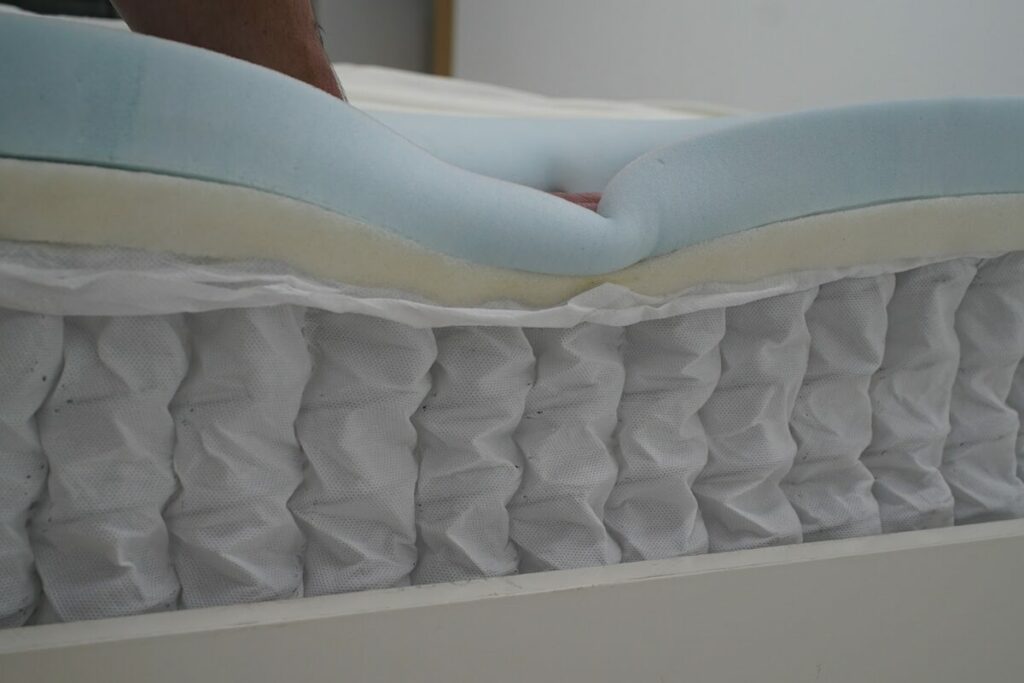
Best value soft mattress: Nolah Original Hybrid
Like any mattress, a soft mattress can be expensive, depending on which brand you buy. And while none of the beds on this list are what we would call cheap mattresses, the Nolah Original Hybrid is the second-least expensive mattress in this roundup, next to the Helix Sunset, which is our best overall pick. Given the quality of this bed’s materials (ultra-plush AirFoam, zoned coils, and cooling Tencel cover), we think this makes it a good value bed—especially since you can often find a queen size mattress for close to (or less than) $1,000 after discounts, which the company frequently runs.
Our final verdict on the Nolah Original Hybrid
Despite the coils of the Nolah Original Hybrid’s support layer, we found the mattress extremely soft. We lightly sank into its layers for a nice hug without feeling too stuck in the mattress when we lay on it. This mattress got high scores for pressure relief, with 4.5 out of five overall. We felt especially comfortable on our backs and sides, although not on our stomachs. Stomach sleepers need something a bit firmer than a five out of 10 to stay properly elevated. According to Christian Busch, a doctor of physical therapy in Asheville, North Carolina, “stomach sleeping can put stress on the back or neck,” which is why a firmer mattress can help alleviate that stress.
From our tester
“The Nolah Original Hybrid does a good job offloading the pressure on my hips and shoulders. I feel like I’m sinking into it a little bit, but I don’t feel stuck.”
The foam in the Nolah Original is made of a proprietary material called AirFoam, which is the company’s more breathable alternative to memory foam. Because it’s not as dense as most foams, it helps the bed sleep cool, as do the coils, which promote airflow.
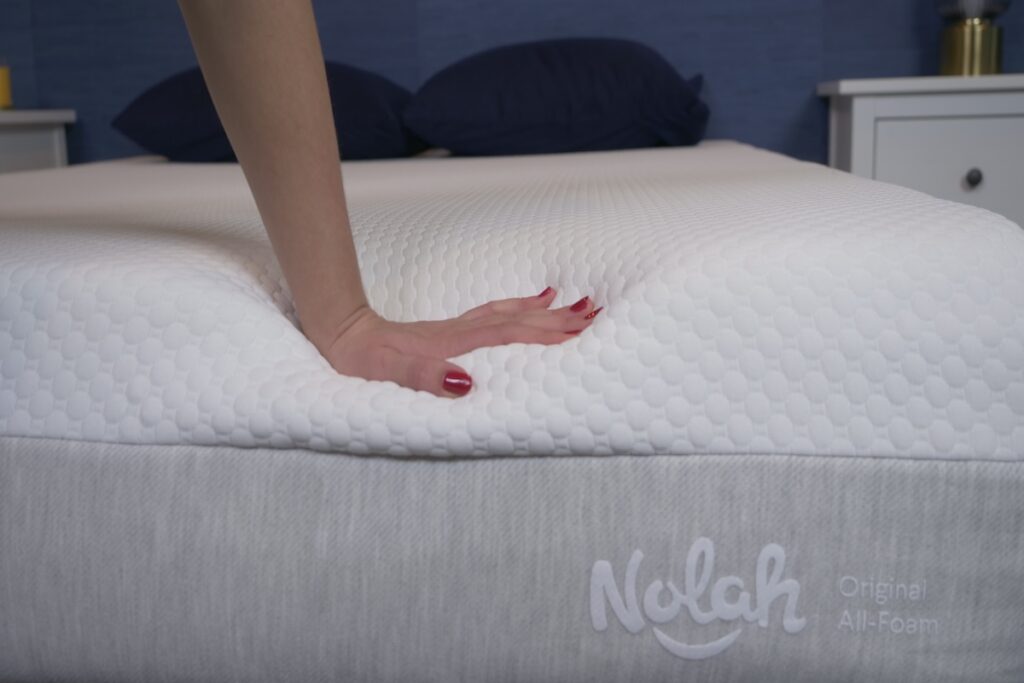
Learn more in our Nolah review.
Best soft mattress for stomach sleepers: Bear Elite Hybrid
Stomach sleepers require much more firmness and support than side and back sleepers since they put more pressure on their mattress. Those who prefer a soft mattress may have difficulty finding one that provides enough support, but we think the Bear Elite Hybrid could be just the right match. Built with two layers of cushy foam and two layers of coils (one for extra edge support and one for overall support), there’s enough softness for deep pressure relief. There’s also enough support to prevent stomach sleepers’ hips from bowing too far into the mattress and throwing their spine out of alignment.
Our final verdict on the Bear Elite Hybrid
When we tested out the Bear Elite Hybrid on our stomachs, we didn’t feel like we were sinking too far into the bed. Rather, we felt a slight lift at the hips, bringing them in line with our shoulders, which is the key to neutral spinal alignment. We also found moving around on the bed’s surface fairly easy.
From our tester
“I like it because the internal springs feel firm, but the cushy top layer provides some added comfort.”
On our mattress firmness scale, we scored the medium-firm Bear Elite Hybrid a 6.5 out of 10. This is the industry standard for medium firmness, but stomach sleepers will likely experience it as softer since they put more pressure on the bed.The Bear Elite Hybrid also comes outfitted with Celliant, a material designed to assist with blood flow and recovery. While we haven’t personally verified this claim ourselves (though some research has shown it is effective), we found it to be a cool sleeping material that could appeal to hot sleepers.
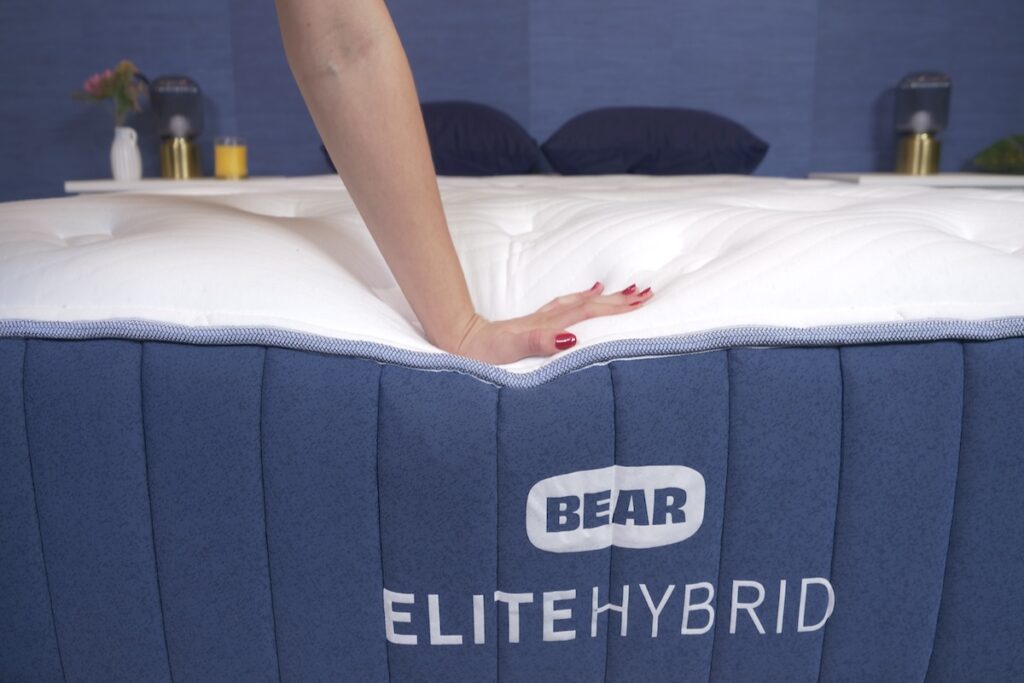
Read more in our in-depth Bear mattress review.
Best soft mattress for side sleepers: Leesa Sapira Chill
Like the name suggests, the Leesa Sapira Chill mattress has many cooling features. First of all, our testers found the cover cool to the touch. The comfort layer is infused with cooling gel to dissipate body heat further, and the pocketed coils promote airflow and breathability.
Our final verdict on the Leesa Sapira Chill
The Leesa Sapira Chill is available in three firmness models: Plush, Medium-Firm, and Firm. Our testers found that the Plush model is best for side sleeping. Its soft feel helps alleviate pressure along the shoulders and hips, which is what side sleepers need most.
From our tester
“As a hot sleeper, I appreciated all of the cooling elements in the Leesa Sapira Chill. The coils offered plenty of spinal support and helped promote airflow. “
Our testers said this mattress had a bouncy and responsive feel, and it was easy to move around on top of the bed. That said, it has a thick comfort layer, so it still isolates motion quite well. In our seismograph tests, we didn’t see a lot of motion after dropping steel balls onto the surface of the bed. This mattress also has impressive edge support, so it’s a good match for couples.
Read more in our Leesa mattress review.
Best soft memory foam mattress: Puffy Cloud
Memory foam is a reliable option when looking for a soft mattress. It’s designed to give sleepers a soothing “hug,” a feeling characterized by contouring and deep pressure relief. In the all-foam Puffy Cloud, you’ll find generous layers of memory foam that should cushion you while still giving you the spinal support you need.
Our final verdict on the Puffy Cloud
When we lay on the Puffy Cloud, we immediately felt the contouring hug that memory foam is known for. According to Kevin Lees, a doctor of chiropractic medicine in Scottsdale, Arizona, “memory foam, although not a great option for everyone, allows the highest-pressure areas to sink and distributes pressure and support evenly.” When turning onto our side, we experienced deep pressure relief at our shoulders and hips. On our back, we felt the foam supported our lumbar region while still getting enough lift from the firmer support foam below to stay neutrally aligned. With this in mind, we think the Puffy Cloud is best for side and back sleepers.
From our tester
“I loved the blend of pressure relief and support on the Puffy Cloud. It should do a good job of reducing aches and pains.”
Another advantage of a memory foam mattress is that it’s great at muffling and isolating motion. We test this by dropping a 10-pound steel ball onto the mattress from different heights and measuring the vibrations with a seismometer. The Puffy had low vibrations, also known as motion transfer, which tells us that if you sleep with a partner or ever share your bed with your family, you’re unlikely to be woken up by each other’s movements.
To learn more about this mattress, read our Puffy Cloud Review.
Best soft mattress for back pain: Birch Natural
If you are looking for the best mattress for back pain, you’ll want to be especially shrewd when selecting a soft mattress. If it doesn’t have enough support, it could throw your spine out of alignment and worsen your pain. That’s why we recommend the Birch Natural—a latex hybrid mattress that’s slightly firmer than the other options on this list. At a 6.5 out of 10 on our mattress firmness scale, we would technically classify it as medium-firm, but someone with back pain who prefers a softer mattress may get just the right amount of support and cushioning.
Our final verdict on the Birch Natural
When we laid on the Birch Natural, we immediately felt some contouring in our lower back, which is key to soothing back pain. As a bonus, the mattress’ latex foam makes it more responsive than traditional memory foam. While we got decent pressure relief from the Birch Natural, it was also easy to move around on its surface and switch positions. This is typical of latex beds known for a bouncy, springy feel. If you have a flare-up of pain in one position, you should have no trouble repositioning yourself.
From our tester
“This mattress responds well to movement. It’s very springy and helps guide you to switch positions. “
When we put the Birch Natural through our pressure map test, the graphic was mostly blue and green, showing low pressure at the back. This is what you want to see if you struggle with back pain.
Finally, we should mention that the Birch Natural is an organic mattress made with environmentally friendly materials, such as naturally sourced latex and organic cotton and wool in the cover and transition layer. Further support and bounce come from the layer of individually wrapped coils at the bottom of the bed.
Learn more about this mattress in our Birch Natural mattress review.
Who should use a soft mattress?
Soft mattresses are often best suited to specific sleeping positions and body types. Side sleepers in particular benefit from cushioning around the hips and shoulders to prevent pressure buildup, so a soft but supportive mattress can be a great option. Back and stomach sleepers tend to do better with firmer mattresses to ensure a neutral spine and proper hip elevation, but a plusher mattress with sufficient support can also work.
If a mattress is too firm, side sleepers can develop pressure points on their shoulders or hips that may be painful. This can lead to tossing and turning to alleviate the pressure.
Kevin Lees, director of chiropractic operations at The Joint Chiropractic in Scottsdale, Arizona
Lightweight sleepers also do well with soft mattresses. Many lighter sleepers lack the weight to sink into firmer mattresses, which can make them feel uncomfortably hard. Softer mattresses can give lightweight sleepers the pressure relief they need.
What type of mattress is softest?
Different mattress types can influence mattress softness to some degree.
Hybrid
Hybrid mattresses combine foam layers with innerspring coils and can offer a great balance of softness and support. Look for pillow and Euro tops for a softer feel.
Memory foam
Memory foam mattresses often feel softest because the material responds to heat and pressure to closely conform around the body.
Innerspring
Innerspring mattresses tend to be firmer because the comfort layers above the coils are thinner. To add softness to an innerspring mattress, you may want to consider a mattress topper.
HelpGuide Handbook’s mattress testing methodology



The Handbook Team hand-tests every mattress we review. We evaluate brands and models by recording our findings on a 42-question standardized testing form to identify standout features and services, document issues with each product, and describe our personal experience lying on each mattress. For example, we record:
- Firmness score and whether the mattress is best for back, side, or stomach sleepers.
- Starting temperature of the mattress and how much it heats up after two testers lie on the mattress for five minutes.
- How many times a 10-pound ball bounces on the mattress after dropping from a height of two feet in order to arrive at a mattress bounce score.
We paid close attention to specific considerations that sleepers of all ages seek, as identified by respondents in our survey of 600 mattress owners. This included price, features, and the set-up process. We also interviewed real people to better understand the motivations behind shopping for a new mattress, as well as the benefits of purchasing one.
As our testers evaluated each brand and its features, we considered why many people choose a new mattress in the first place. Of our respondents, 42 percent decided to purchase a new mattress for “improved comfort and support for better sleep,” while only seven percent did so for “pain relief and targeted support.” The most common pain respondents wanted relieved was lower back pain.
Despite only 42 percent of respondents prioritizing comfort and support for better sleep when shopping for a new mattress, 68 percent reported they sleep longer on their new mattress and 49 percent and 45 percent, respectively, said their stress and anxiety had improved after switching to their new mattress. Almost all mattress owners we surveyed (95 percent) were at least somewhat satisfied with their new mattress. We consulted sleep experts, physical therapists, occupational therapists, and pain specialists to understand what mattresses offer that make an overwhelmingly positive impact.
According to our survey
According to our survey, about 80 percent of all respondents said their new mattress helps them sleep better, and 65 percent reported improved mental health.
In order to focus on the mattresses themselves, we structured our test designs to objectively rank each one based on a range of criteria. For example, we tested things like bounce, edge support (the sturdiness of your mattress edge), and cooling capabilities the same way on each mattress and compared the results. That way we can accurately compare each mattress’s score in an unbiased way while also sharing our subjective point of view as mattress testers and experts. To choose the best soft mattresses, we looked for options with a firmness rating below 6.5 and a plush feel.
Lastly, we compared warranty lengths, trial periods, and white glove delivery (in-home delivery and setup) options. While most brands offer warranties, not all are comprehensive. And many brands on the market don’t have free white glove delivery. This could be a deal-breaker if you’re nervous to invest in a new mattress because you’re worried the bed won’t get set up properly or offer what you need.
A note on our testing
We acknowledge that every body is different, and what feels comfortable to one person may not feel comfortable to another. Throughout our reviews, we refer to weight categories as light (below 130 pounds), average (130–250 pounds), and higher-weight (above 250 pounds) to distinguish between body weights.
Frequently asked questions
It depends on your needs and preferences. We usually recommend that stomach sleepers and higher-weight sleepers (i.e., anyone over 250 pounds) look for a firmer mattress that can give them the support they need. That said, there are still soft options that can work for them; they’re just harder to find.
We classify a soft mattress as anything that scores a six or lower on our mattress firmness scale. For context, the industry standard for medium-firm is 6.5.
Yes, if it doesn’t have the right level of support. If back or hip pain concerns you, we recommend seeking a soft mattress with a layer of coils. These can give you a slight lift and help keep your joints and spine supported.
- Gordon, I. L., Casden, S., Vangel, M., & Hamblin, M. R. (2019). Effect of shirts with 42% Celliant™ fiber on tcPO2 levels and grip strength in healthy subjects: A placebo-controlled clinical trial. Journal of Textile Science & Engineering, 9(4), 403.
- (2022, March 16). How sleep deprivation impacts mental health. Columbia University Irving Medical Center. Link
- Scott, A.J., Webb, T.L., Martyn-St James, M., Rowse, G., & Weich, S. (2021). Improving sleep quality leads to better mental health: A meta-analysis of randomised controlled trials. Sleep Medicine Reviews, 60, 101556. Link



